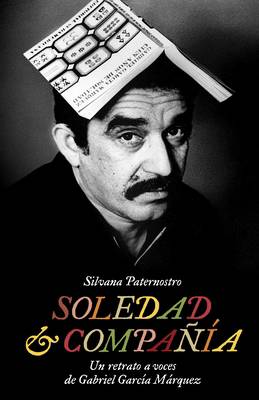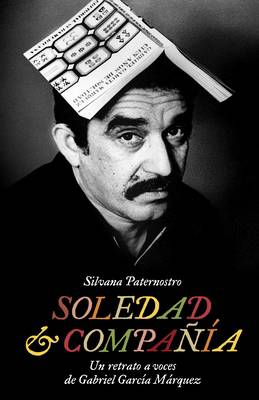
- Retrait gratuit dans votre magasin Club
- 7.000.000 titres dans notre catalogue
- Payer en toute sécurité
- Toujours un magasin près de chez vous
- Retrait gratuit dans votre magasin Club
- 7.000.0000 titres dans notre catalogue
- Payer en toute sécurité
- Toujours un magasin près de chez vous
Soledad & Compañía / Soledad & Co.
Un Retrato a Voces de Gabriel García Márquez
Silvana Paternostro
Livre broché | Espagnol
23,95 €
+ 47 points
Description
Este libro es un boleto de entrada para una fiesta en la que todos hablan, todos gritan, todos opinan, se contradicen y hasta dicen mentiras. Bienvenidos. Soledad & Compañía es un retrato humano, fresco e irreverente de Gabriel García Márquez donde se entretejen las voces de sus amigos, sus seres queridos y hasta sus detractores, quienes nunca antes habían compartido sus historias con el primerio Nobel. Habla su mítica agente Carmen Balcells, su traductor al inglés, la española a quien dedicó Cien años de soledad, y hasta el escritor norteamericano William Styron, entre otros. Lo que se va desvelando es la biografía de Gabo desde los tiempos desordenados y esperanzadores en que un muchacho de provincia se propuso ser escritor hasta convertirse en uno de los autores más universalmente leídos y admirados. ENGLISH DESCRIPTION An oral history biography of the legendary Latin American writer and Nobel laureate Gabriel García Márquez, brimming with atmosphere and insight. Irrevent and hopeful, Solitude & Company recounts the life of a boy from the provinces who decided to become a writer. This is the story of how he did it, how little Gabito became Gabriel García Márquez, and of how Gabriel García Márquez survived his own self-creation. The book is divided into two parts. In the first, BC, before Cien años de soledad (One Hundred Years of Solitude), his siblings speak and those who were friends before García Márquez became the universally loved Latin American icon. Those who knew him when he still didn't have a proper English tailor nor an English biographer, and didn't accompany presidents. It gathers together the voices around the boy from the provinces, the sisters and brothers, the childhood friends, the drinking buddies and penniless fellow students. The second part, AC, describes the man behind the legend that García Márquez became. From Aracataca, to Baranquila, to Bogota, to Paris, to Mexico City, the solitude that García Márquez needed to produce his masterpiece turns out to have been something of a raucous party whenever he wasn't actually writing. Here are the writers Tomás Eloy Martínez, Edmundo Paz Soldán and William and Rose Styron; legendary Spanish agent Carmen Balcells; the translator of A Hundred Years of Solitude Gregory Rabassa; Gabo's brothers Luis Enrique, Jaime, Eligio and Gustavo, and his sisters Aida and Margot; María Luisa Elío, to whom A Hundred Years of Solitude is dedicated; and so much more: a great deal of music, especially the vallenato; the hilarious scenes of several hundred Colombians, García Márquez's chosen delegation, flying to Stockholm for the Nobel Prize celebrations; the time Mario Vargas Llosa punched Gabriel García Márquez in the face; and much, much more. In Living to Tell the Tale, the first volume of García Márquez's autobiography, Gabo writes: "I am consoled, however, that at times oral history might be better than written, and without knowing it we may be inventing a new genre needed by literature: fiction about fiction." Solitude & Company joins other great oral histories, like Jean Stein and George Plimpton's Edie: American Girl, their oral history biography of Edie Sedgwick, or Barry Gifford's oral history of Jack Kerouac, Jack's Book--an intimate portrait of the most human side of Gabriel García Márquez told in the words of those who knew him best throughout his life.
Spécifications
Parties prenantes
- Auteur(s) :
- Editeur:
Contenu
- Nombre de pages :
- 288
- Langue:
- Espagnol
Caractéristiques
- EAN:
- 9780307951410
- Date de parution :
- 14-10-14
- Format:
- Livre broché
- Format numérique:
- Trade paperback (VS)
- Dimensions :
- 130 mm x 201 mm
- Poids :
- 272 g

Les avis
Nous publions uniquement les avis qui respectent les conditions requises. Consultez nos conditions pour les avis.






